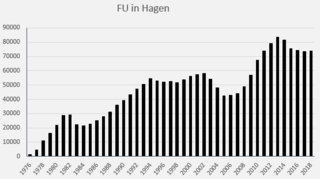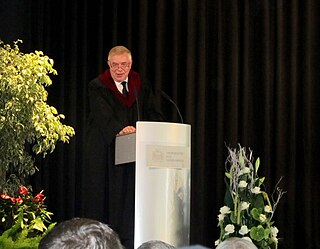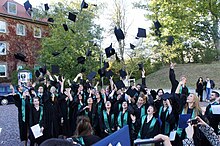
Leipzig University, in Leipzig in Saxony, Germany, is one of the world's oldest universities and the second-oldest university in Germany. The university was founded on 2 December 1409 by Frederick I, Elector of Saxony and his brother William II, Margrave of Meissen, and originally comprised the four scholastic faculties. Since its inception, the university has engaged in teaching and research for over 600 years without interruption.

The Center for European Integration Studies is a transdisciplinary research and post-graduate education institute at the University of Bonn. ZEI has participated in research, policy advice, and dialogue between science and practice since its establishment in 1995. ZEI directors are Prof. Dr. Ludger Kühnhardt and Prof. Dr. Christian Koenig.

The Environmental Campus Birkenfeld (ECB) is a branch of the Hochschule Trier in the state of Rhineland-Palatinate, Germany. It is close to the small town of Birkenfeld in Rhineland-Palatinate, close to the border of Saarland, Luxembourg, Belgium and France. There are 2,500 students enrolled in two departments. There are a total of 59 professors teaching in both departments.

Sigmund Freud University (SFU) is a private and for-profit university accredited by the Austrian Accreditation Council in August 2005 located in Vienna, Austria. As a university in the field of Human Sciences, SFU specializes in Psychotherapy Science, Psychology, Medicine, and Law. Professor Alfred Pritz serves as Director of Sigmund Freud University, and Professor Giselher Guttmann serves as Academic Dean.

Founded in 1229, the Toulouse Capitole University is one of the three universities of the city of Toulouse, in southwestern France. This university, presided by Hugues Kenfack, focuses on the social sciences. An active member of the Federal University of Toulouse, Toulouse Capitole University became an experimental public institution on January 1, 2023.

Saarland University is a public research university located in Saarbrücken, the capital of the German state of Saarland. It was founded in 1948 in Homburg in co-operation with France and is organized in six faculties that cover all major fields of science. In 2007, the university was recognized as an excellence center for computer science in Germany.

The University of Hagen is a public research university that is primarily focused on distance teaching. While its main campus is located in Hagen, North Rhine-Westphalia, Germany, the university maintains more than 50 study and research centers in Germany and throughout Europe. According to the Federal Statistical Office of Germany, it is Germany's second-largest university. The university was founded in 1974 as a public research university by the state Nordrhein-Westfalen and began its research and teaching activities in 1975. It was founded following the idea of UK's Open University to provide higher and continuing education opportunities through a distance education system in Germany.
The Virtual Global University (VGU) is a virtual university offering online distance education or virtual education on the Internet.

Foreign Trade University is a public university established in 1960, located in Hanoi, Vietnam with satellite campuses in Ho Chi Minh City and Quảng Ninh.

A European Documentation Centre (EDC) is a body designated by the European Commission to collect and disseminate publications of the European Union for the purposes of research and education. There are 400 such centers in all member states of the EU. The mandate of an EDC is to receive all official EU publications, documents, contracts and electronic databases then make them available to researchers, educators, students, and interested members of the general public. The centers are also legal depositories of Acquis communautaire (EU law). Although primarily academic in nature, anyone can visit an EDC to consult official EU publications.

The Graduate Institute of International and Development Studies, or the Geneva Graduate Institute, abbreviated IHEID, is a government-accredited postgraduate institution of higher education located in Geneva, Switzerland.
Master of European Law is a specialized Master of Laws (LL.M.) degree, awarded after successful completion of a course of study in the law of the European Union and preparation of subsequent master's thesis within this field.

The Institute for Law and Finance (ILF) is a graduate school which was established as a non-profit foundation in 2002 by Goethe University Frankfurt am Main with the support of many prominent institutions. Leading commercial banks and international law firms, the Frankfurt Chamber of Commerce and Industry, the City of Frankfurt and the State of Hesse, as well as the European Central Bank and the Deutsche Bundesbank are actively involved in the ILF right from the planning stages until today. The ILF provides interdisciplinary training to lawyers, senior management and executives in Germany and worldwide and serves as a policy center in the legislative process by offering forums for discussions and exchanges between academia and practitioners.
The Europa-Kolleg Hamburg is a foundation under private law. Its objective lies in the promotion of research and postgraduate education in the field of European integration and international cooperation. The foundation provides financial and administrative support for these purposes.
Thomas Giegerich is a German jurist. He is professor for European law, international law and public law at Saarland University and director of the Europa-Institut, Saarbrücken.

Werner Meng was a German jurist and Director of the Europa-Institut since 1999 as well as the holder of the Chair of Public Law, International Law and European Law at Saarland University.
Torsten Stein (*1944) is a German jurist. He was the holder of the Chair of European Law and European Public Law at Saarland University as well as the Director of the Europa-Institut, Law Department of Saarland University from 1991 to 2012.
The Otto-Selz-Institute of Applied Psychology (OSI) in Mannheim, Baden-Wuerttemberg, Germany is a psychological and interdisciplinary research institute and an associated institution within the University of Mannheim. Under the leadership of Prof. Dr. Georg W. Alpers, president of the Institute, and Prof. Dr. Sabine Matthäus, vice president of the institute, OSI employs a staff of about 20 researchers and additional support staff. The OSI was established in Mannheim in 1964 and is still headquartered there. The institute was named after the German pioneer of neuroscience and last director of the Handelshochschule Mannheim Otto Selz.
Wolfgang Theodor Wessels is a German political scientist. He holds the Jean Monnet Chair ad personam in political science, is a retired professor at the University of Cologne, and the head of the Centre for Turkey and European Studies (CETEUS) at the University of Cologne.
















